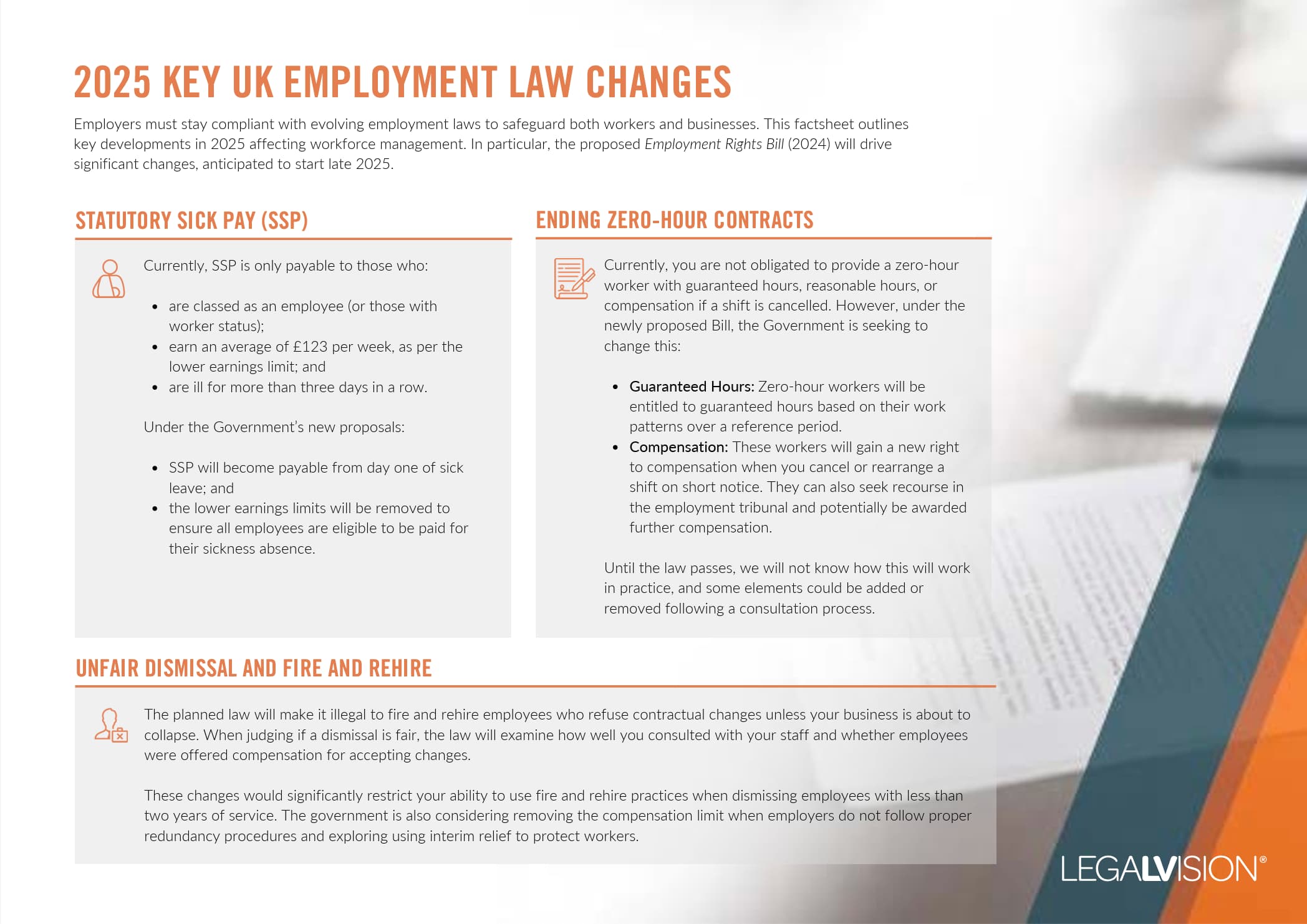When you employ staff to help run your business, they have a specific role. If they do not do this correctly, it can impact your company. As a last resort, you may need to consider the dismissal of an employee where they cannot correctly carry out their role. This can include where their poor health affects their job, such as through long-term sickness absence. However, you must dismiss them lawfully, or you could face an unfair dismissal claim in an employment tribunal. This article will explain the legal guidelines for medical capability dismissal in the UK.
What is Capability Dismissal?
Capability dismissal is when an employer terminates an employee’s employment contract because they:
- are not performing correctly; or
- have poor health.
You can only legally dismiss an employee fairly on five grounds, of which capability dismissal is one. The other fair grounds are:
- misconduct;
- illegality;
- redundancy; and
- another substantial reason.

This factsheet outlines key developments in 2025 affecting workforce management.
What is Medical Capability Dismissal?
Medical capability dismissal is when you dismiss your employee due to their poor health. This is where it prevents them from doing their job correctly and can be either physical or mental health. Medical capability dismissal can be carried out due to an employee:
- having regular patterns of time off work for sickness, which you suspect may be dishonest;
- being on long-term sick leave where a return to work plan cannot be agreed; or
- being on long-term sick leave and recovery is impossible, and adjustments cannot be made to help them return to work.
If you are considering medical capability dismissal, you should get legal advice from an employment solicitor to avoid an unfair dismissal claim.
Continue reading this article below the formHow Do I Deal With Medical Capability Issues?
If you are considering medical capability dismissal, you must treat your employee fairly beforehand and follow a fair procedure before you make this decision. This needs to meet the ACAS standards. Your procedure should include:
- monitoring absences;
- consulting your business’ disciplinary policy; and
- correctly following your sickness absence policy.
A lawful sickness absence policy may include, for example:
- how colleagues report sickness and how they self-certify this;
- how you monitor sick leave;
- what will trigger formal review meetings;
- how you will help your employees return to work;
- whether you will invite them to an interview as part of returning to work;
- that you will keep good records; and
- how you will keep in touch with them when absent from work.
What Do I Need to Ensure Before Medical Capability Dismissal?
Medical capability dismissal should be a last resort, and this is a legal requirement. As part of a fair and lawful procedure, you must not discriminate. Also, before resorting to dismissal, you should show you have done all you can to help them carry out their role for return to work. You also need to prove that the sickness levels have disrupted your business in terms of how it operates.
Ways to assist your employees when they come back to work include:
- offering your employee an alternative role;
- providing options for a plan to return to work;
- making reasonable adjustments where your employee has a disability;
- arranging an occupational health assessment for your employee;
- asking your employees permission to get a medical report from their GP;
- demoting your employee;
- reassigning your employee to a different role; or
- mutually agreeing to end the contract with a settlement agreement.
If you cannot show that this dismissal has been carried out as a last resort, such as by proving you have carried out any of the above, it may be an unfair dismissal.
You must remember that where your employee’s poor health is a disability, you must not discriminate when dismissing them, as this could lead to a discrimination claim. By law, you must make reasonable adjustments for these employees. However, if there are no reasonable adjustments you can make, you may be able to fairly dismiss your member of staff.
Key Takeaways
You may decide to consider dismissal of an employee who is not performing correctly or has poor health so unable to carry out their role. Where this is the case, you may engage in medical capability dismissal. When dealing with medical capability issues you must follow a fair and lawful procedure before dismissal, which does not discriminate. This must meet the ACAS standard and should include a sickness absence policy or a disciplinary policy. Such dismissal must be a last resort, so there are actions you should take to help your employee return to work. This can include, for example, offering them an alternative role or making reasonable adjustments as required by law where their poor health is a disability.
If you need help understanding the legal guidelines for medical capability dismissal in the UK, our experienced employment lawyers can assist as part of our LegalVision membership. For a low monthly fee, you will have unlimited access to lawyers to answer your questions and draft and review your documents. So call us today on 0808 196 8584 or visit our membership page.
Frequently Asked Questions
Medical capability dismissal is one of the five legal reasons you can dismiss an employee.
Medical capability dismissal should be a last resort when an employee’s poor health affects their conduct. This is a legal requirement.
We appreciate your feedback – your submission has been successfully received.







